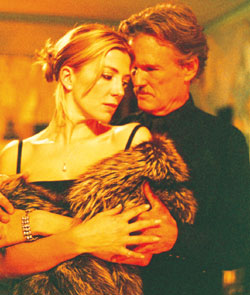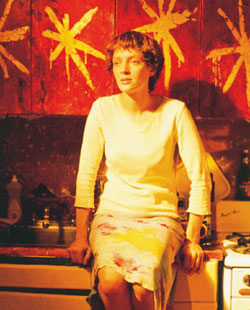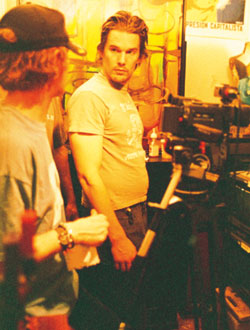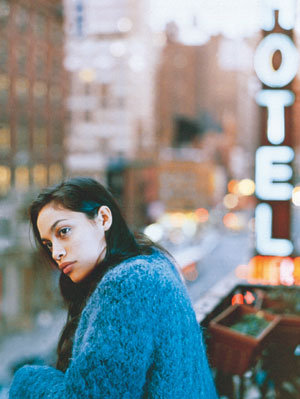BOHEMIAN RHAPSODY
With his debut feature, the poetic Chelsea Walls, Ethan Hawke has summoned an incredible cast to Manhattan’s choice artistic haunt – the Chelsea Hotel.
By Scott Macaulay.
Rosario Dawson in Chelsea Walls.
Little Jimmy Scott sings in an ethereal falsetto, an androgynous voice that evokes a magical sense of timelessness. Both an actor and performer in Ethan Hawke’s new Chelsea Walls, Scott "has the voice of an angel and can break your heart," says former Chelsea Hotel resident Lou Reed. "When the song stops with Jimmy’s last note, we’re back in the world as it was. Not quite so pretty, not quite so passionate."
Reed’s comments could just as easily refer to Chelsea Walls, Hawke’s bittersweet ode to love, artists and the artistic temperament. Scott’s languorous vocals are just one of several threads connecting four stories set within Manhattan’s most famous artist’s residence, the Chelsea Hotel. Employing the same playful experimentation practiced by the Chelsea’s most famous residents – Thomas Wolfe, Reed, Sid Vicious, Leonard Cohen, Viva and particularly Kerouac and the Beats – Hawke’s directorial debut is no conventional independent feature. The actor-turned-director uses miniDV cameras and the InDigEnt no-budget production model to create an intimate and painterly digital film suffused with affecting emotion.
Chelsea Walls will be released in April by Lions Gate Films.
FILMMAKER: There’s a mythology of the Chelsea Hotel, that it’s this bohemian mecca. Is that mythology all in the past, or is it alive today?
ETHAN HAWKE: For the past 60 years, people have probably thought the mythology was in the past. But mythology is always happening. People do that with their own lives – they have these great myths about their childhood, and then once they’re 40, they create these myths about their 20s. I wonder if when Lou Reed was hanging out in the Chelsea Hotel he thought the high point of the Chelsea was over because Thomas Wolfe had lived there in the ’40s? I don’t know. But I think the mystique is very much alive today. The place is still loaded with artists – all the paintings in the movie are from painters who really live there.
FILMMAKER: Does your interest in the Chelsea predate this movie?
HAWKE: When I first came to New York City in 1988 – and it sounds kind of corny – I’d pass by there and think, Bob Dylan wrote "Sad Lady of the Lowlands" here! Dylan Thomas wrote Under Milkwood here! I saw Matt Dillon walk out, and I was like, this place is the coolest! [laughs] You know, if you want to be a Catholic priest, you might make a trip to Notre Dame or something like that. But if you dream of being a bohemian weirdo, then your mecca is the Chelsea Hotel.
 |
| Natasha Richardson and Kris Kristofferson
in Chelsea Walls. |
HAWKE: When you’re working with a non-narrative, you have to make up in this kind of abstract sense what your narrative is. How are you going to lead the audience through something that basically has no shape? I’ve always said the movie is a double album. What’s neat to me about [setting the film at] the Chelsea is that, for example, like Exile on Main Street, it gives a body, a shape to the collection. It’s a tone piece, a musical in that way.
FILMMAKER: You just described the movie as "non-narrative." Did you always envision it as being part of a specific tradition of non-narrative films? My first thought when I saw the film, actually, was that it reminded me of Robert Frank’s work – something like Pull My Daisy, almost.
HAWKE: If anybody was an inspiration, [it was Robert Frank]. I read this book called Beat Cinema, and I just loved it. And the Chelsea Hotel itself was an inspiration – you know, Kerouac typed up Naked Lunch in the Chelsea Hotel for Burroughs. There was something about their spirit of play and having fun that I liked.
FILMMAKER: What about your choice of, like Traffic, giving each story its own specific look?
HAWKE: There were four main story lines, so we came up with this theory. Every scene either has Grace (Uma’s character), Bud (Kristofferson’s character), Robert Sean Leonard’s character or Rosario Dawson’s character in it. In some way, [the movie] spins around those four people. So each one of those storylines would have its own decade, its own style of shooting and its own color. When all put together, they would make up the whole. So for example, Uma’s room is done in a gold palette, and Bob Sean Leonard and Steve Zahn’s room is all done in red, Rosario and Mark Webber’s room is blue, and then Kristofferson’s is done with no primary colors – black-and-white in its own way. And so Kristofferson was a ’60s film, Uma was in a ’70s kind of thing and her room was all ’70s’d out. The blue room – the lovers – was the ’80s, because we [shot it all with a] steadicam. Remember in the ’80s when everything was Steadicam? Also [the Steadicam] gave a nice flow to the lovers’ theme. And then the red room was the ’90s, and we did that all hand-held and with available light, so it was our Dogme [section]. The idea is that when you put the red, the blue, and the yellow together, you have the whole color palette. It sounds kind of corny, but when you’re dealing with something so amorphous, [you need] rules!
FILMMAKER: How tough or how easy was it to realize that stylised visual scheme with miniDV cameras?
 |
| Uma Thurman |
FILMMAKER: When people talk about the ease of making a movie on DV, they forget about post-production. And the thing about DV is, the editing is excruciating.
HAWKE: Richard Linklater says, "What DV giveth, DV taketh away." Yeah, it’s easier to shoot, it’s harder to cut, it’s a bitch to blow up. When we did Tape, virtually every review of the movie was positive, but [they all] mentioned that it was a DV movie. The problem with that is that nobody then wants to see it! It’s like, "All you film geeks can go see that, but I’m going to wait until they make a real movie." The beautiful thing about DV now is that it’s totally enjoyable. Chelsea Walls looks great. Oliver Stone and Bob Richardson could spend millions of dollars trying to make a movie that looks like that. They’d shoot it on 16mm and pour coffee on it and then bleach it – you know what I mean? – to get this terrific look [laughs]!
FILMMAKER: Why did you make Chelsea Walls your first feature? Why –
HAWKE: Why go so left?
FILMMAKER: Yes.
HAWKE: Well, first off, because it’s my true nature. I’m just more interested in going left. And I love this woman writer, Nicole Burdette. I have been a huge fan of her writing for years. I was in a reading of this play that she had called Chelsea Walls, which was very different, but spiritually the same, really. And I thought, god, I should send this to Wim Wenders; he could make this into a movie. And Nicole said to me, well, you do it. And I was like, nobody would give me the money, and then I couldn’t do it the way I want. But when I saw Celebration, I said, you know what, maybe now is the time for this idea.
FILMMAKER: From being an actor, what did you bring to the direction of the actors, especially with this medium? Would you have directed them differently had you been shooting 35mm?
HAWKE: DV forces you to focus in on the performers, because, if you shoot really good actors, they make it cinema. We couldn’t have made this movie on 35mm. I could say to Robert Sean Leonard and Steve Zahn, "Okay, I want to try to get you guys just playing together, writing a song together." So we literally put two cameras in a bathroom in the Chelsea Hotel, put Bob and Steve in there with a couple of guitars, and everybody went away for three hours. And they just sat there and played. You get these great moments, and it creates a kind of naturalism to acting that you can’t buy. With 35mm we would have had to pre-record the sound, they’d be lip-synching, we’d have to have walls that could move out. And all of a sudden it’s a very different experience, for the viewer as well.
FILMMAKER: Tuesday Weld.
HAWKE: I was in seventh heaven the day we were doing that big scene [Kristofferson and her] have together. I think some critic once said – or it might actually be in a Sam Shepard short story – that Tuesday Weld is the Marlon Brando of women. I’ll tell you what – she should be in every movie. She was wonderful to work with – so intense and such an interesting human being.
FILMMAKER: Had you worked with her before?
HAWKE: I was just a fan. What was it, Who’ll Stop the Rain? I always really liked her. When I asked to meet her, and she asked me to come over, we talked a lot about the script, and she told me that if this DV thing made her look like shit, she’d rip my eyes out! But, ultimately, I think she enjoyed working with me, and she looks great in [the movie].
FILMMAKER: I think a lot of young actors hear about DV and are like, "Yeah, let’s try it." But then I wonder what some of the seasoned professionals think.
HAWKE: You know, basically, I had to sell them on the idea that, "Hey, the world keeps turning." I said to Kris, "Look, I’m not Sam Peckinpah and this ain’t a 35mm camera, but it’s going to be great." All these people are artists. Tuesday Weld, Kris Kristofferson, they get it. If you’re going to do something that isn’t totally straight up the middle, you gotta be playful in how you achieve it.
FILMMAKER: As an actor, what are you looking forward to these days? A young director maybe coming to the medium of DV for the first time, or are you looking forward to working with the masters? What challenges you?
 |
| Ethan Hawke on set.
|
FILMMAKER: It must be a funny time, with Chelsea Walls being released and Training Day earning you an Academy Award nomination. I imagine you are getting offers for big-budget action films, but at the same time, I can imagine someone seeing Chelsea Walls and sending you some completely odd, interesting other kind of project.
HAWKE: That’s just the weird line I’m trying to walk. Training Day comes out and all of a sudden they’re like, "Maybe we should offer him an action movie," which has its appeals in certain regards. If you can navigate the weird waters of celebrity, you grease the rails to being able to do a lot of interesting things. You know, it’s nice to get Kris Kristofferson to return your call. You’re making a movie for $100,000 and you can’t offer him anything except an opportunity to play some great scenes. All the people who came together for this movie – celebrity greases the rails for all that. So if you can keep that up without losing your soul… Oftentimes you meet young actors who think, well, I’m going to do this really lame-brained thing, which I know is lame-brained, but later I’ll get to do what I want to do. And the problem is, if you are not actively cultivating in yourself what it is you want to do and actively growing, you are not going to just stumble on what you really want to do. It has to arise organically out of you. And if you’re on the film set getting paid $80 million a day to run through doorways holding a gun, you are probably not going to do that much growing.
VOD CALENDAR


 See the VOD Calendar →
See the VOD Calendar →



